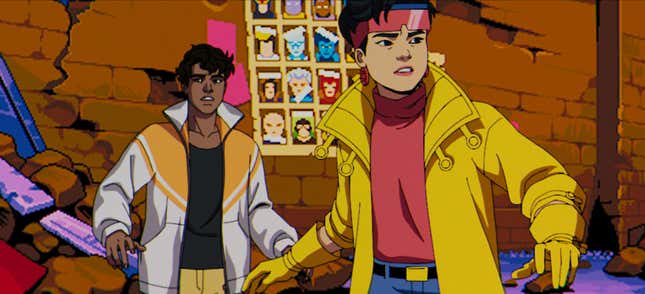X-Men as a franchise can be defined by one idea: adapt or die. Indeed, the X-Men wouldn’t exist beyond their ‘60s heyday if they hadn’t evolved or changed, from the renaissance of the Chris Claremont run, to their adaption to the times in the ‘90s, to New X-Men and beyond, all the way to the Krakoan age—and whatever lies beyond it. Holding on to the past is always a fool’s endeavor for mutantkind; its best stories are instead about building onto that past, feeding into a tapestry that shapes, but should rarely ever define, these heroes forever.
It’s funny, then, to see this problem begin to be tackled by none other than X-Men ‘97—the most deliberate throwback and play to nostalgia possible, to a cultural apex the X-Men can never seemingly escape. But that’s exactly what “Motendo/Lifedeath, Part 1,” today’s episode of the X-Men: The Animated Series continuation, is actually about. And it’s about both of these things in their truest sense. If last week’s riff on the life and times of Madelyne Pryor was ‘97 making a rare stumble as it attempted to encapsulate a generation of comic book storytelling into 30 minutes—at the cost of what should’ve been its spotlight character—this week’s dual-story episode weaves its central conceit around a bevy of callbacks, Easter eggs, and comic hints that is almost dizzying to try and wade through.

And yet, it works, because it’s the point. The “Motendo” side of the episode is the driver here, following Jubilee—who, despite her key role as the audience surrogate figure in X:TAS, was rarely allowed grow beyond an inexperienced teen with sparkler powers—on her 18th birthday when, in a fit of rebellion, she ditches Magneto’s planned drills to go play video games with Sunspot. Almost immediately, the duo find the Sega Genesis-esque console that’s appeared in her room is a trap. It whisks them away into the machinations of Mojo, the alt-dimension, media-obsessed alien mastermind who’s now pivoted from schlocky TV to gaming—and the references start early, come often, and just do not stop.
It’s more than just a pixel-art tribute to the X-Men’s own arcading heyday. “Motendo” weaves in elements of the Mojoverse stories of the comics, on top of layered references to gaming history beyond the X-Men, and then references to X-Men itself—iconic comic covers, moments from the Animated Series, ideas and stories that have all transitioned from comics, to cartoons, to games, flung one after the other. Crucially, understanding them is not important to the story “Motendo” wants to tell, unlike last weeks’ riff on “Inferno” stumbling where it couldn’t cover the emotional spine of its source material without more context. Even when it all climaxes in another intermingled web of references—Jubilee and Bobby get pulled out of Mojo’s gaming-verse by a masked woman named Abscissa, revealing herself to be an older Jubilee trapped as a perpetual beta tester for Mojo, and voiced by none other than Alyson Court, Jubilee’s original voice actress in The Animated Series—the message of “Motendo” is made clear to Jubilee and the audience alike: all this nostalgia is good and fun in the moment, but it can’t be a life. Times have moved on, Jubilee is getting older, and the sooner she realizes that she needs to go with that flow instead of staying stuck in reliving the hits, she can become the kind of person she wants to be—a lesson that hopefully we’ll see X-Men ‘97 continue to compartmentalize, as it navigates the tightrope of its own inherently nostalgic premise with the desire to explore more and say things about the X-Men’s storied history.

It’s less relevant, but still a potent underlying component of, the other half of this episode: “Lifedeath, Part 1,” X-Men ‘97‘s take on a seminal moment in Storm’s comic book history. Although not given as much time as it deserves here—we’re getting the rest next week, already an important lesson learned from “Fire Made Flesh”—Storm’s trajectory with Forge, as she navigates a life without her mutant powers while also brushing up against a potential way to restore them, touches on similar messages about needing to discover the person you’re becoming, instead of holding on to the person you once were. “Lifedeath, Part 1” gives this tale to both Storm and Forge himself, who briefly touches upon his history in military service (what was, in the comics, Marvel’s direct riff on the Vietnam War) and the loss of his arm and leg—and a desperation to fully explore his mutant gift for technology creation leading to him making a deal with the devil in Washington.
Both Storm and Forge alike have to grapple with the choices they’ve made in losing the people they both were—but even if that personal growth is momentarily interrupted by the arrival of another thread from the comics, the demonic being called the Adversary (a major villain with ties to Forge’s Cheyenne background who, momentarily, is responsible for the X-Men’s presumed death, leading to their “Outback” era in the late ‘80s)—the stage is set for next week’s episode to tackle these ideas in a fascinating parallel to “Motendo” and its more specific nostalgia play. And, after all, that’s what X-Men ‘97 should be doing at its very best: playing with and weaving in all these references to the past, and using that connection to push its characters into new and exciting places.
X-Men ‘97 streams on Disney+.
Want more io9 news? Check out when to expect the latest Marvel, Star Wars, and Star Trek releases, what’s next for the DC Universe on film and TV, and everything you need to know about the future of Doctor Who.
Trending Products

Cooler Master MasterBox Q300L Micro-ATX Tower with Magnetic Design Dust Filter, Transparent Acrylic Side Panel…

ASUS TUF Gaming GT301 ZAKU II Edition ATX mid-Tower Compact case with Tempered Glass Side Panel, Honeycomb Front Panel…

ASUS TUF Gaming GT501 Mid-Tower Computer Case for up to EATX Motherboards with USB 3.0 Front Panel Cases GT501/GRY/WITH…

be quiet! Pure Base 500DX Black, Mid Tower ATX case, ARGB, 3 pre-installed Pure Wings 2, BGW37, tempered glass window

ASUS ROG Strix Helios GX601 White Edition RGB Mid-Tower Computer Case for ATX/EATX Motherboards with tempered glass…










